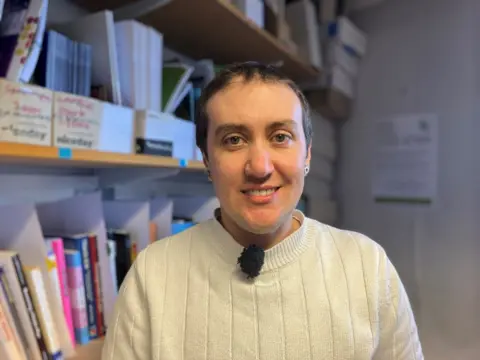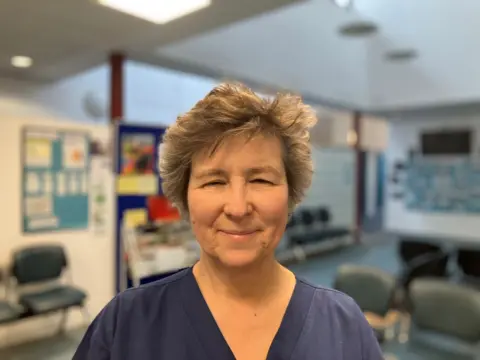Why are transgender healthcare waiting times so long?
 BBC
BBCSince 2018, the number of people waiting for a first appointment at a gender identity clinic in Scotland has risen from under 1,000 to more than 5,000.
Campaigners say the high demand for specialist help is down to improved social attitudes towards trans people, which makes it easier for them to come out.
But GPs say the long waits can put them in the impossible position of trying to care for patients without expert support.
The Scottish government promised a new set of national rules for doctors on gender reassignment two years ago but they have still not been published.
How long are the waiting times?
A Freedom of Information request by BBC Scotland News revealed that at the end of 2023 there were about 5,300 people in total on waiting lists for Scotland's five gender identity clinics (GICs). The smallest adult clinic, in Inverness, had 86 people in the queue, while the biggest, in Glasgow, had almost 3,000.
Scotland's only specialist gender clinic for under-18s, also at the Sandyford in Glasgow, has more than 1,100 patients on its waiting list.
Every year, hundreds more people are referred to these clinics either by their GP or by self-referral through NHS websites - which carry a warning of significant waits.
Nationally, the average wait is now more than three years for adults and in excess of four years for under-18s.
But at the Sandyford, the longest wait for an adult is currently 2,048 days - more than five-and-a-half years - and for a child, 1,692 days, about four-and-a-half years.
NHS Greater Glasgow and Clyde, which runs the Sandyford Clinic, has apologised for the "considerable" waiting times. It said there were some recruitment challenges and that it was constantly reviewing its procedures.
The Scottish government said it recognised that waiting times to access gender identity healthcare services were too long.
It said these services were subject to the same pressures as the wider NHS as well as some more specific challenges.
The Scottish government said more than £2.8m had been invested, including help for health boards to recruit staff, cut waiting times, and support those currently waiting.
What are the current rules on gender reassignment?

In 2012, the Scottish government issued all health boards with a Gender Reassignment Protocol, which was hailed as a pioneering policy incorporating the latest international best practice.
It sets out which procedures can be accessed on the NHS and details the criteria for recommending hormone prescription and referral for surgery, along with the associated risks and management guidelines.
There is only a short appendix dealing with patients under 18 experiencing gender dysphoria. The 2012 protocol predates the young people's service at the Sandyford, so says any child requiring treatment should be referred to the Tavistock Gender Identity Development Service (Gids) in London.
However, the Tavistock has been earmarked for closure since 2022, when it was found to be failing to meet the needs of children and young people in England and Wales.
In 2021, Scotland's chief medical officer Dr Gregor Smith ordered a review of the gender protocol, informed by "advances in evidence, models of care and changes in terminology".
He promised a new protocol to "promote, protect and realise the rights of every trans and non-binary person in Scotland", including a revised section on children and young people.
But two-and-a-half years later, doctors are still waiting for Dr Smith to approve a new national protocol. An update issued last November said a draft had been submitted by civil servants, but was held back for more work to be carried out before publication.
In December, the Scottish government said it would pursue reforms of transgender healthcare as it gave up its court battle with the UK government over the Gender Recognition Reform (GRR) Bill.
Why do activists say it needs to be updated?

Vic Valentine, from Scottish Trans, said the delay in reforming this increasingly complex area of healthcare was frustrating.
"The current protocol was world-leading when it was released in 2012, but it's now quite out of date," Vic said.
"In particular it doesn't recognise all the different and diverse ways that trans people can describe our identities and it's a bit one-size-fits-all in what it assumes people might want in terms of treatments.
"A lot of the services are based on a more historical idea that saw being trans as a mental health problem, when actually it's just part of our identity."
Vic said things such as speech and language therapy, hair removal treatments and access to hormones could all be carried out by specialist GPs and specialist nurses.
Winter James, 29, from Glasgow, joined the NHS waiting list in July 2021 but said the "only option" was to go private.
"It's frustrating that I've had to do that, it feels like the health service has let me down," Winter said.
"The way things are at the moment, it makes it very difficult for a lot of trans people to access any sort of care through the NHS.
"If you're questioning your gender identity, you'll have to wait on a long wait list to get to see a clinic and have an assessment before you can even talk to someone professionally through the NHS."
Why do GPs feel they are in an impossible situation?

Currently, GPs are left as the only point of NHS contact for most trans people, and many don't have any specialist training.
Dr Catriona Morton, from the Royal College of GPs, said the lack of a proper framework for specialist support was making it difficult for both doctors and patients.
"Transgender patients have often spent many years thinking about transitioning and they feel that having treatment is a right. And that's correct," Dr Morton said.
"Sometimes people feel we should just be able to prescribe hormones and it's easy, but actually, all the hormones that we use have risks and they're not minor risks."
She said they did not want to create shortcuts which would lead to GPs prescribing without looking at all the risks and doing a full assessment.
Dr Morton added that GPs could be left in a "very difficult situation" when patients turned to the private sector, which was often unregulated, and they thought they should be prescribed hormones.
"We can't assess every private provider. For some GPs, it feels an impossible situation," Dr Morton said.
"But the way to avoid that is to have proper NHS services."
The Scottish government said it was working to finalise an updated Gender Identity Healthcare Protocol which is expected to be published this spring.
Meanwhile, it said wider improvement work was ongoing over access to gender identity healthcare, including developing new standards and a new education framework for NHS staff.
What is happening with children's services?
The Scottish government said work to address the provision of gender identity healthcare for young people and children was taking place separately.
It said the model of care depended "on a variety of factors" specific to NHS Scotland but it would consider the recommendations of Dr Hilary Cass, who is leading a major review of children's gender services in NHS England.
Dr Cass recommended a new regionalised model of care for England and Wales to replace the controversial Tavistock clinic in London.
While the opening of the first of NHS England's new young people's clinics has been delayed, it has been announced that puberty blockers will now not be made routinely available to young people outside of research studies.
There is no such guidance for doctors in Scotland.
NHSGGC, which runs the children's service at the Sandyford, said it would carry out a multi-disciplinary assessment over a number of appointments, including a robust psychological assessment.
"There are times following these appointments where some patients are referred to endocrinology for puberty blockers," it said.
"They would be further assessed for suitability. Puberty blockers are just one point of intervention and they are currently used in small numbers."
